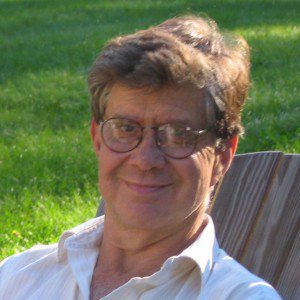Another One-More
Waking in a hollow
like a shaded clearing in an old forest
as, beyond the window
of the dusky room the sun coursed
higher, I ruminate on the metaphor
not of a “big” birthday, like one of the o’s –
three-oh, four-oh, uh-oh five-oh –
but just another of the one-more’s,
decade-whichever, add two, or seven, or four.
As my small birthday dawdles forward, I receive,
from those not here, deliciously long long-distant phone calls,
from those here, chocolate-on-chocolate, picaresquely short on candles.
On this just-another one, or six, or three,
in my forest clearing, far below the canopy,
I feel the sun pouring down on me.
• • •
Keywords II
Poetry is not my natural language,
or, I should say, not my acquired native tongue.
I grew up in a community whose keywords –
because, therefore, in conclusion –
took us on long, roundabout hikes
tracking probable cause from conclusion back to its source,
or up rivers of explanation that flowed down
through forests of facts, defiles of logic and meadows of must-be
from white peaks of assumption.
Being young, I studied earnestly
and earned better than passing grades,
though I spoke with a noticeable glibness.
Later I studied poets who wrote like natives –
Shakespeare, Keats, Goethe, Pushkin –
and later still I explored other modes of articulation,
Greek sculpture, cave drawings, Gregorian chants,
poetry in translation from Polish, Hindi, Hopi.
Still, when I try to write,
only the underlying poetic impulse seems natural.
What comes, as it were instinctively, to me
are keywords of analysis and abstraction –
logically, consequently, connectivity –
words as dry as wisps of straw,
or words long accepted as “poetic” –
ere, oft, soul, dapple, topaz, hyacinth –
words as worn as bald tires.
Like a resident alien trying to master native speech,
in poetry I hunt for words,
for the accurate expression.
On the page I speak hesitantly, with an accent,
and I work every day to become more fluent.
• • •
Llyn Clague’s poems have been published widely in journals such as California Quarterly, Atlanta Review, Wisconsin Review, Main Street Rag, The Avalon Literary Review, Ibbetson Street, and other magazines. His seventh book, Hard-Edged and Childlike, was published by Main Street Rag in 2014.
Keywords II
Poetry is not my natural language,
or, I should say, not my acquired native tongue.
I grew up in a community whose keywords –
because, therefore, in conclusion –
took us on long, roundabout hikes
tracking probable cause from conclusion back to its source,
or up rivers of explanation that flowed down
through forests of facts, defiles of logic and meadows of must-be
from white peaks of assumption.
Being young, I studied earnestly
and earned better than passing grades,
though I spoke with a noticeable glibness.
Later I studied poets who wrote like natives –
Shakespeare, Keats, Goethe, Pushkin –
and later still I explored other modes of articulation,
Greek sculpture, cave drawings, Gregorian chants,
poetry in translation from Polish, Hindi, Hopi.
Still, when I try to write,
only the underlying poetic impulse seems natural.
What comes, as it were instinctively, to me
are keywords of analysis and abstraction –
logically, consequently, connectivity –
words as dry as wisps of straw,
or words long accepted as “poetic” –
ere, oft, soul, dapple, topaz, hyacinth –
words as worn as bald tires.
Like a resident alien trying to master native speech,
in poetry I hunt for words,
for the accurate expression.
On the page I speak hesitantly, with an accent,
and I work every day to become more fluent.
• • •
